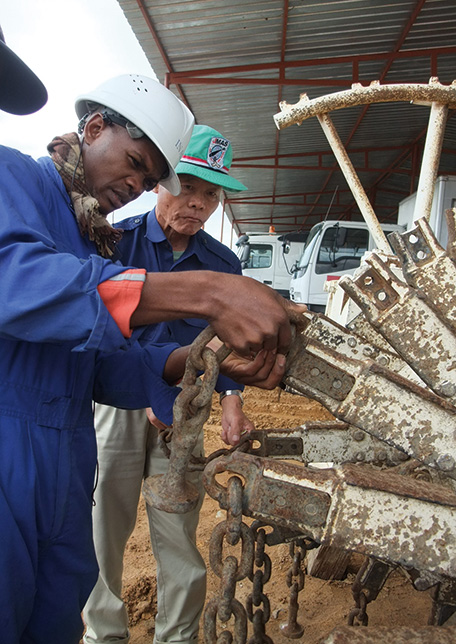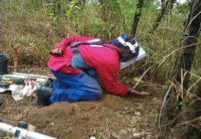Japan's Official Development Assistance White Paper 2012
(5) Unexploded Ordnance, Antipersonnel Landmines, and Small Arms and Light Weapons, etc.
In post-conflict regions, unexploded ordnance (UXO) including cluster munitions and antipersonnel landmines remain, and illegal small arms and light weapons are still widespread. These explosive remnants of war indiscriminately harm children and other members of the general public, and not only hinder reconstruction and development activities, but can also become the cause of new conflicts. It is important to provide support that takes into consideration the security concerns of the affected country, through assistance including the clearance of UXOs and landmines, the collection and disposal of illegal small arms and light weapons, and the empowerment of landmine victims.
<Japan's Efforts>
As a state party to the Convention on Cluster Munitions and the Convention on the Prohibition of the Use, Stockpiling, Production and Transfer of Anti-Personnel Mines and on their Destruction, Japan has actively encouraged other nations to ratify or accede to these Conventions through its universalization efforts. Japan is also consistently involved in international cooperation in support of clearance, victim assistance, risk reduction education and other projects set forth in both conventions.
Laos, for example, has endured particularly great suffering from UXOs. In 2011, a project focusing on countermeasures for UXOs was set up, and its three pillars of the cooperation are: (i) dispatching an expert on UXOs; (ii) providing equipment; and (iii) South-South Cooperation. Japan has experience in supporting Cambodia clear landmines since the 1990s, and it has embarked on a 3-year South-South Cooperation project to facilitate Laos and Cambodia share knowledge with each other through holding several workshops on UXO/Mine Action. This cooperation aims to share their knowledge and experience on techniques, drilling, devising national standards and supporting victims.
Japan supports actions against land mines and UXOs (clearance, risk reduction education) in Afghanistan, Sudan, Somalia, the Democratic Republic of the Congo and the Republic of the Congo through the United Nations Mine Action Service (UNMAS) under the UN Department of Peacekeeping Operations (DPKO) in addition to granting bilateral aid.
To tackle the issues of small arms and light weapons, Japan provides support for the collection, disposal, and appropriate storage and management of small arms, in combination with development assistance. With a view to improving security as well as strengthening the capacity to regulate the import and export of weapons, Japan also supports for the development of relevant legal systems, the improvement of the capacities of customs agencies, police forces and other law enforcement agencies, and DDR and social reintegration of former soldiers and child soldiers.

A JICA land mine removal expert teaching maintenance in Angola. (Photo: Kayo Omachi/JICA)
●Mozambique
Project for Humanitarian Mine Clearance Activities in Manica Province III
Grant Assistance for Grassroots Human Security Projects (March 2011-Present)
An estimated 1 million landmines were buried in Mozambique during the period from its independence in 1975 to the conclusion of the Mozambican Civil War in 1992. These landmines have become a major obstacle against the country's socioeconomic development. The Mozambique government formulated a National Mine Action Plan and is working to completely eliminate landmines from the country by March 2014, deadline of the Ottawa Treaty*.
In support of the efforts of the Mozambique government, Japan has used grant aid for grassroots human security projects to remove anti-personnel landmines and dispose of unexploded bombs in Manica Province, where the largest minefield in Mozambique is located. Japan's support during Phase I (2008) and Phase II (2009) helped remove landmines from four districts of Manica Province and make them safe for their population of nearly 150,000 people.
Support during Phase III will create a safe living environment for another 9,500 people living near minefields and improve the livelihoods of approximately 28,800 people who pass through or use them.
*Ottawa Treaty: A convention that prohibits the use, stockpiling, production and transfer of anti-personnel mines and obligates state parties to remove and dispose of stockpiled and buried landmines.

Landmine removal work (Photo: Mozambique National Demining Institute (IND))
